九年级英语作文教学
人教版九年级英语全册Unit5作文教学设计
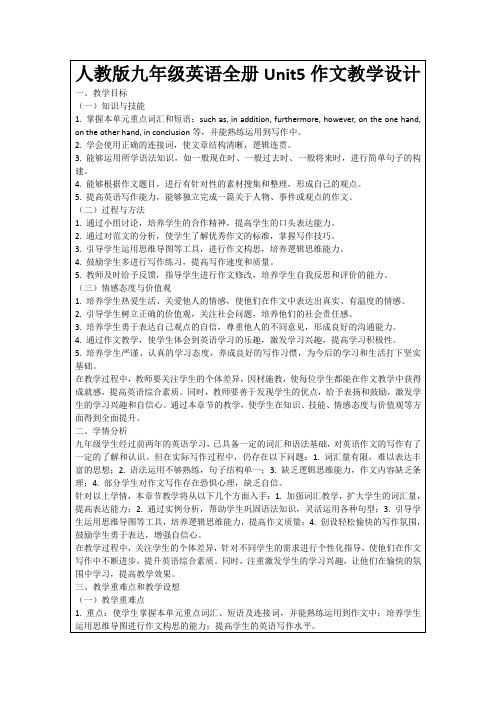
在教学过程中,教师要关注学生的个体差异,因材施教,使每位学生都能在作文教学中获得成就感,提高英语综合素质。同时,教师要善于发现学生的优点,给予表扬和鼓励,激发学生的学习兴趣和自信心。通过本章节的教学,使学生在知识、技能、情感态度与价值观等方面得到全面提升。
ቤተ መጻሕፍቲ ባይዱ二、学情分析
九年级学生经过前两年的英语学习,已具备一定的词汇和语法基础,对英语作文的写作有了一定的了解和认识。但在实际写作过程中,仍存在以下问题:1.词汇量有限,难以表达丰富的思想;2.语法运用不够熟练,句子结构单一;3.缺乏逻辑思维能力,作文内容缺乏条理;4.部分学生对作文写作存在恐惧心理,缺乏自信。
2.提问学生:“Can you describe a person you admire? Why do you admire this person?”通过这个问题,让学生尝试用英语表达自己的想法,为新课的学习打下基础。
3.引导学生回顾已学的写作技巧,为新课的学习做好知识储备。
(二)讲授新知,500字
2.结合课堂所学,对同伴的作文进行互评。从词汇、语法、结构、内容等方面提出建议,促进相互学习,共同提高。
3.收集并整理有关人物的描写素材,如性格特点、外貌特征、兴趣爱好等,为下周的写作课做好准备。
4.自选一个话题,运用思维导图进行作文构思,并在课后完成一篇作文。要求运用本节课所学的写作技巧,提高作文质量。
2.各组选取一位代表进行汇报,分享本组的讨论成果。
3.鼓励学生相互提问、评论,激发思维碰撞,提高课堂氛围。
(四)课堂练习,500字
课堂练习环节旨在巩固所学知识,提高学生的写作能力。
1.布置一篇与本节课话题相关的作文,要求学生在规定时间内完成。
初三英语作文课说课稿

初三英语作文课说课稿一、课程目标1. 掌握基本的英语写作技巧,包括文章结构、语法和词汇的正确使用。
2. 学会如何构思和组织英语作文,提高写作的逻辑性和条理性。
3. 培养学生的批判性思维能力,能够在作文中表达自己的观点和论据。
4. 通过写作练习,提升学生的语言表达能力和文化素养。
二、教学内容1. 作文类型介绍:介绍不同类型作文的特点,如叙事文、议论文、说明文等。
2. 文章结构讲解:讲解英语作文的基本结构,包括引言、主体和结尾。
3. 语法和词汇:重点讲解英语写作中常见的语法错误和词汇选择。
4. 写作技巧:教授如何使用连接词、过渡句等技巧,使文章更加流畅。
5. 思维导图:使用思维导图帮助学生组织思路,构建作文框架。
6. 写作练习:提供不同主题的写作练习,让学生实践所学技巧。
三、教学方法1. 互动式教学:鼓励学生参与课堂讨论,分享自己的写作思路。
2. 小组合作:通过小组合作的方式,让学生相互评价和修改作文。
3. 实例分析:分析优秀作文示例,让学生了解好的写作标准。
4. 角色扮演:在议论文写作中,让学生扮演不同角色,从多角度思考问题。
四、教学过程1. 导入新课:通过提问或展示图片,激发学生对写作主题的兴趣。
2. 讲解新知:详细讲解作文的结构、语法和词汇使用。
3. 示范写作:教师示范写作过程,展示如何构思和组织文章。
4. 学生练习:学生根据给定主题进行写作练习。
5. 作文评价:教师和学生共同评价作文,指出优点和需要改进的地方。
6. 课后作业:布置相关的写作作业,巩固课堂所学。
五、教学反思1. 反思教学方法是否有效,学生是否能够理解和掌握写作技巧。
2. 思考如何根据学生的反馈调整教学策略,提高教学效果。
3. 考虑如何将写作与学生的实际生活经验相结合,提高写作的实用性和趣味性。
通过这节课,我们希望学生不仅能够提高英语写作能力,还能够在写作中表达自己的思想和情感,培养批判性思维和创造力。
初三英语作文如何教

初三英语作文如何教在教授初三英语作文时教师可以采取以下步骤来帮助学生提高写作技能1. 理解作文要求首先确保学生理解作文的题目和要求。
这包括作文的类型如叙述文议论文说明文等字数限制以及评分标准。
2. 教授写作结构向学生介绍英语作文的基本结构包括引言Introduction主体Body 和结尾Conclusion。
强调每个部分的作用和重要性。
3. 词汇和语法训练提高学生的词汇量和语法知识是写作的基础。
通过词汇练习和语法练习帮助学生掌握正确的表达方式。
4. 思维导图教授学生使用思维导图来组织思路和论点。
这有助于学生在写作前清晰地规划文章结构。
5. 写作练习提供不同类型的写作练习让学生实践所学知识。
可以从简单的句子练习开始逐步过渡到段落和整篇文章的写作。
6. 范文学习向学生展示优秀的作文范文分析其结构用词和表达方式。
让学生从中学习并模仿。
7. 互评和自评鼓励学生相互评价作文以及进行自我评价。
这有助于他们从不同角度审视自己的写作并学会如何改进。
8. 错误分析在学生写作后教师应认真批改作文指出常见的错误和不足之处并提供改进建议。
9. 定期复习定期复习写作技巧和知识点确保学生不会遗忘所学内容。
10. 鼓励创造性思维鼓励学生发挥创造性不仅仅局限于模仿范文而是要尝试用自己的语言和想法表达观点。
11. 使用技术工具利用在线资源和软件如语法检查工具来辅助学生写作。
这些工具可以帮助学生检查语法错误和拼写错误。
12. 个性化反馈针对每个学生的作文提供个性化的反馈帮助他们了解自己的强项和需要改进的地方。
通过这些步骤教师可以帮助初三学生提高英语写作能力为高中阶段的学术写作打下坚实的基础。
初中英语作文教案

初中英语作文教案一、教学目标:1.能够掌握基本的英语作文写作技巧;2.能够运用所学知识,写出简单、连贯、有逻辑的英语作文;3.培养学生的英语写作兴趣,提高写作能力。
二、教学重点:1.培养学生的写作兴趣;2.教授基本的英语写作技巧;3.激发学生的写作创造力。
三、教学难点:1.如何培养学生的写作兴趣;2.如何激发学生的写作创造力。
四、教学内容:1.教师引导学生阅读范文,分析范文结构、语言表达等;2.教师讲解英语作文写作技巧,如句型搭配、词汇运用等;3.教师指导学生进行写作训练,如写作练习、写作指导等;4.教师布置作业,让学生在家继续练习写作。
五、教学过程:1.教师引导学生阅读范文,分析范文结构、语言表达等,激发学生的写作兴趣;2.教师讲解英语作文写作技巧,如句型搭配、词汇运用等,提高学生的写作能力;3.教师指导学生进行写作训练,如写作练习、写作指导等,培养学生的写作技能;4.教师布置作业,让学生在家继续练习写作,巩固所学知识。
六、教学方法:1.导入法,通过引导学生阅读范文,激发学生的写作兴趣;2.讲授法,通过讲解英语作文写作技巧,提高学生的写作能力;3.示范法,通过指导学生进行写作训练,培养学生的写作技能;4.作业法,通过布置作业,巩固所学知识,提高学生的写作水平。
七、教学手段:1.多媒体课件,用于展示范文、写作技巧等;2.教学实物,如英语作文书籍、写作范文等;3.黑板报,用于记录重点、难点内容,帮助学生复习。
八、教学检查与评价:1.教师在课堂上进行实时检查,发现学生写作中的问题并及时纠正;2.教师在课后进行作业批改,对学生的写作进行评价,指导学生改进。
九、教学反思:1.教师要及时调整教学方法,根据学生的实际情况进行针对性教学;2.教师要注重培养学生的写作兴趣,激发学生的写作热情;3.教师要关注学生的写作能力提高情况,及时进行评价和指导。
初中英语作文教案到此结束,希望本教案能够帮助到广大英语教师,提高学生的写作水平。
人教版英语九年级全册Unit13写作优秀教学案例

四、教学内容与过程
(一)导入新课
1.教师通过展示一张地球图片,让学生观察并发表对地球环境的看法,引导学生思考环境保护的重要性。
4.教师通过鼓励和表扬,激发学生的学习兴趣,使他们在愉悦的氛围中学习,提高他们的学习积极性。
三、教学策略
(一)情景创设
1.教师可以通过展示环境污染的图片、播放相关视频等方式,创设真实且富有感染力的情景,激发学生的学习兴趣和情感共鸣。
2.设计角色扮演活动,让学生扮演环保专家、政府官员等角色,进行模拟对话或辩论,增强学生对环境保护的认识。
3.学生能够学会使用恰当的连接词和过渡语,使文章逻辑清晰,条理分明。
4.学生能够通过阅读和分析范文,掌握写作技巧,提高写作能力。
(二)过程与方法
1.通过情景创设,引导学生主动参与课堂活动,提高学生的积极性和主动性。
2.利用小组讨论、同伴互助等方式,培养学生合作学习的能力,提高学生的团队协作精神。
3.通过写作实践,引导学生反复修改和润色自己的作品,培养学生的自我反思和自我修正能力。
(五)作业小结
1.教师布置作业,要求学生运用所学知识,写一篇关于环境保护的短文。
2.学生完成作业后,教师对作业进行评价和反馈,指出学生的优点和不足,给予改进建议。
3.学生根据教师的评价,修改和完善自己的作品,提高写作水平。
五、案例亮点
1.情景创设:本案例通过展示地球图片和提问的方式,引导学生思考环境保护的重要性,激发了学生的学习兴趣和情感共鸣。这种情景创设不仅有助于学生主动参与课堂活动,还能增强他们对环境保护的认识和责任感。
初三英语作文写作指导方法
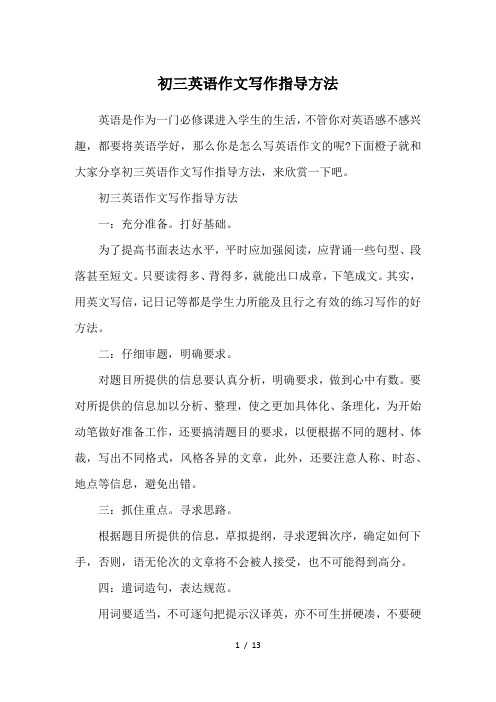
初三英语作文写作指导方法英语是作为一门必修课进入学生的生活,不管你对英语感不感兴趣,都要将英语学好,那么你是怎么写英语作文的呢?下面橙子就和大家分享初三英语作文写作指导方法,来欣赏一下吧。
初三英语作文写作指导方法一:充分准备。
打好基础。
为了提高书面表达水平,平时应加强阅读,应背诵一些句型、段落甚至短文。
只要读得多、背得多,就能出口成章,下笔成文。
其实,用英文写信,记日记等都是学生力所能及且行之有效的练习写作的好方法。
二:仔细审题,明确要求。
对题目所提供的信息要认真分析,明确要求,做到心中有数。
要对所提供的信息加以分析、整理,使之更加具体化、条理化,为开始动笔做好准备工作,还要搞清题目的要求,以便根据不同的题材、体裁,写出不同格式,风格各异的文章,此外,还要注意人称、时态、地点等信息,避免出错。
三:抓住重点。
寻求思路。
根据题目所提供的信息,草拟提纲,寻求逻辑次序,确定如何下手,否则,语无伦次的文章将不会被人接受,也不可能得到高分。
四:遣词造句,表达规范。
用词要适当,不可逐句把提示汉译英,亦不可生拼硬凑,不要硬拿英语单词到中文句子里去对号,否则写出中文式英语,闹出笑话。
一般来讲,写作时,应尽量选出你有把握的词,尽量使用短句(简单句)。
如果有的单词不会写,有的思想不会用英语表达,你可以设法绕开,最好找一个同义词、同义句,或近义词、词组短语来代替。
要正确使用关联词,如asdfsnd,or,but,so,becasdfsuse,since 等,以便行文自然流畅。
五:修改润色,锦上添花。
作文写完之后,应注意检查修改,修改时先从全局修改。
首先要检查主题是否明确,表达方式是否恰当,接下来检查所写内容是否切题,该交待的内容是否交待了,最后检查所用时态、人称是否符合要求,最后是否一致。
写完后,还应仔细校阅1—2遍。
校阅要逐词逐句进行,注意检查语法、拼写、标点、大小写等方面的错误。
校阅是自检的最后一关,应严肃认真的进行,尽可能地消灭一切差错,增强文章的效果。
人教版九年级英语全册Unit6写作课优秀教学案例

1.教师引导学生对自己的写作过程进行反思,思考自己的优点和不足。
2.学生通过自我评价,认识自己的写作进步和需要改进的地方。
3.教师对学生的写作进行评价,关注学生的努力和进步。
4.采用多元化的评价方式,如同伴评价、小组评价等,全面评价学生的写作能力和思维能力。
作为一名特级教师,我深知教学策略的重要性。在教学过程中,我将灵活运用情景创设、问题导向、小组合作和反思与评价等教学策略,以提高学生的学习兴趣和能力,培养他们的思维能力和团队合作精神。同时,我将根据学生的实际情况和需求,不断调整教学策略,确保教学效果的最大化。
4.反思与评价:教师引导学生对自己的写作过程进行反思,认识自己的优点和不足,并通过多元化的评价方式,如同伴评价、小组评价等,全面评价学生的写作能力和思维能力。这种教学策略有助于培养学生的自我评价和反思能力,提高他们的自信心和自主学习能力。
5.个性化的写作任务:学生根据自己的喜好选择自己最喜欢的节日进行写作,这种个性化的写作任务能够激发学生的创造力和写作兴趣,提高他们的写作动机和成就感。
(四)总结归纳
1.教师引导学生回顾本节课所学的词汇、短语和语法知识,并强调其在写作中的重要性。
2.教师总结本节课的学习内容,强调描述节日和阐述理由的方法和技巧。
3.学生进行写作练习,运用所学的知识和技巧,描述自己最喜欢的节日并阐述理由。
(五)作业小结
1.教师布置作业,要求学生根据自己的写作练习,修改和完善作文。
3.通过提问,引导学生关注节日与环境、社会的关系,思考节日意义。
4.鼓励学生提出自己的问题,培养他们主动思考和探究的能力。
(三)小组合作
1.学生在小组内分享自己的节日经历和喜好,进行互动交流。
人教版英语九年级全一册Unit1SectionB(3aSelfCheck)写作课优秀教学案例
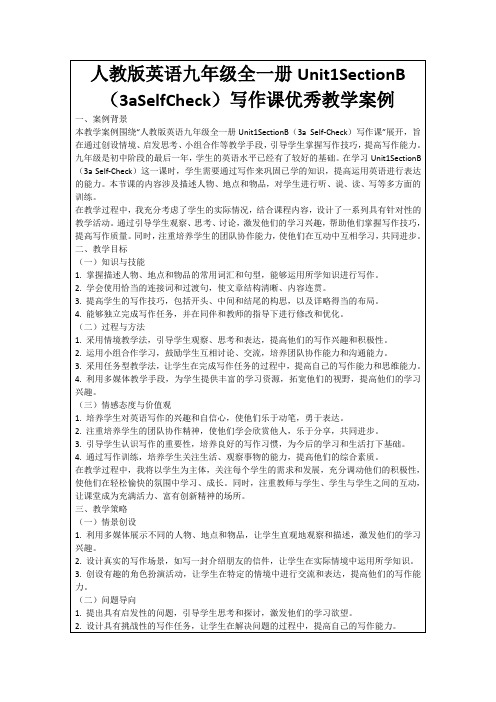
3.提高学生的写作技巧,包括开头、中间和结尾的构思,以及详略得当的布局。
4.能够独立完成写作任务,并在同伴和教师的指导下进行修改和优化。
(二)过程与方法
1.采用情境教学法,引导学生观察、思考和表达,提高他们的写作兴趣和积极性。
2.运用小组合作学习,鼓励学生互相讨论、交流,培养团队协作能力和沟通能力。
在教学过程中,我充分考虑了学生的实际情况,结合课程内容,设计了一系列具有针对性的教学活动。通过引导学生观察、思考、讨论,激发他们的学习兴趣,帮助他们掌握写作技巧,提高写作质量。同时,注重培养学生的团队协作能力,使他们在互动中互相学习,共同进步。
二、教学目标
(一)知识与技能
1.掌握描述人物、地点和物品的常用词汇和句型,能够运用所学知识进行写作。
3.小组合作学习:在本案例中,我组织了学生进行小组讨论和合作,让他们在互动中学习,共同完成写作任务。这种小组合作学习方式培养了学生的团队协作能力和沟通能力,提高了学生的写作质量和学习兴趣。
4.反思与评价:我引导学生对自己的写作进行反思,思考如何改进和提高,培养他们的自主学习能力。同时,组织学生进行互评和自我评价,让他们学会欣赏他人的优点,发现自己的不足。教师对学生的写作进行评价,关注他们的进步和优点,给予鼓励和指导。这种反思与评价方式有助于提高学生的写作能力,培养他们的批判性思维和自我调整能力。
人教版英语九年级全一册Unit1SectionB(3aSelfCheck)写作课优秀教学案例
一、案例背景
本教学案例围绕“人教版英语九年级全一册Unit1SectionB(3a Self-Check)写作课”展开,旨在通过创设情境、启发思考、小组合作等教学手段,引导学生掌握写作技巧,提高写作能力。
英语人教版九年级全册初三英语作文教案
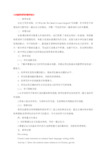
九年级英语写作教学设计一、教学内容议论文写作训练,以“Why Do We Need to Learn English”为话题,针对学生不知道如何才能写好一篇议论文的情况,开展一节如何写好一篇英语作文的专题课。
二、学情分析本堂课的教学对象是九年级的学生。
他们积累了语言运用的一定基础,班级整体英语学习的氛围较好,有能力完成本堂课的写作任务。
但是大部分学生缺乏谋篇布局的能力:句子结构单一,篇章缺乏逻辑性和条理性;尤其是对议论文的写作,很大一部分学生不能抓住重点,写出的文章观点不明确,论据不充分。
在这样的情况下,给予学生正确的方法和理念的指导是非常必要的。
三、教学目标(一)、写作技能目标1、了解并掌握议论文的写作的基本技能,并能运用这些基本技能更好地完成一篇短文。
2、培养学生发现问题的能力,提高学生解决问题的水平。
3、学会把握语篇的整体性、关联性和逻辑性。
4、培养写作中的创新意识和想象力。
5、学会运用正确的评价方式反思自己的写作行为和结果。
(二)、学习策略目标1.从字词到句子再到文章的整体教学流程,使学生能学会如何思考一篇文章的写作流程。
2.采取小组合作形式,与同伴合作交流,互相帮助共同提高写作技能。
(三)、情感目标使学生能明白体育锻炼和抓好学习二者之间的辩证关系,能过正确对待合理的体育锻炼;培养学生的合作学习的意识,为今后的学习打好基础。
四、教学重点与难点1. 如何掌握议论文的基本结构,写好一篇议论文。
2.掌握议论文的基本写作技巧;怎样把握文章的整体性、关联性和逻辑性。
五、教学过程Pre-writingCorrect some sentences to enhance basic language writing skills.Activity 1. Show the students some sentences in Chinese, get thestudents to translate them into English.1.英语在世界上广泛使用;外出旅游、学习以及生活等都离不开英语;2.学习英语可以了解西方文化,了解世界;3.英语很重要,英语也是中学的一门考试学科;4.将来工作很多方面都需要用上英语Activity2. Write an outline标题:(要求每个字母都大写)Let students discuss the title of the composition in groups. Then call out some students to show their answers on the blackboard.首段:引出话题-----提出论点Let students think it over, and show their ideas to the class.第二段:至少三个观点,每个观点之后至少有一句阐述性的语言。
教师如何教好初三英语作文
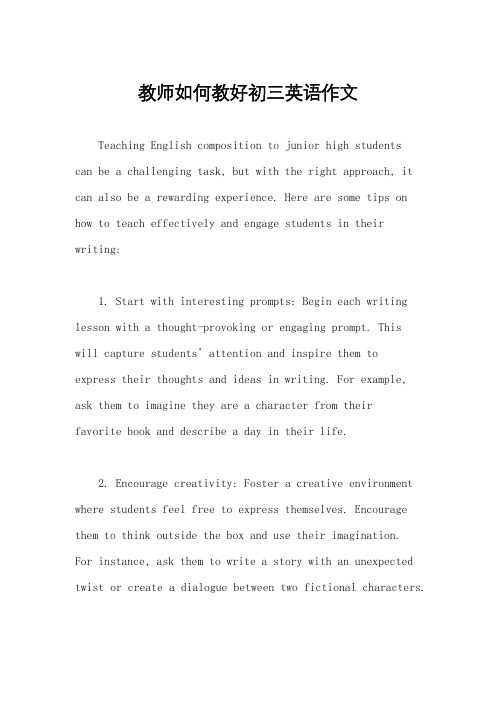
教师如何教好初三英语作文Teaching English composition to junior high studentscan be a challenging task, but with the right approach, it can also be a rewarding experience. Here are some tips on how to teach effectively and engage students in their writing:1. Start with interesting prompts: Begin each writing lesson with a thought-provoking or engaging prompt. Thiswill capture students' attention and inspire them toexpress their thoughts and ideas in writing. For example, ask them to imagine they are a character from theirfavorite book and describe a day in their life.2. Encourage creativity: Foster a creative environment where students feel free to express themselves. Encourage them to think outside the box and use their imagination.For instance, ask them to write a story with an unexpected twist or create a dialogue between two fictional characters.3. Provide models and examples: Show students examples of well-written essays or stories to help them understand the structure and language used in different genres. This will give them a reference point and help them developtheir own writing style. Additionally, share examples from various sources like newspapers, magazines, or online articles to expose students to different writing styles and perspectives.4. Focus on vocabulary and grammar: Teach students new vocabulary and grammar structures that they can use intheir writing. Introduce them to synonyms, idioms, and expressions to enhance their language skills. For instance, teach them how to use descriptive adjectives or adverbs to make their writing more vivid and engaging.5. Provide feedback: Give constructive feedback on students' writing to help them improve. Focus on both content and language, highlighting areas where they excel and areas that need improvement. Encourage peer feedback as well, as this can help students learn from each other and develop their critical thinking skills.6. Incorporate technology: Utilize technology tools, such as online writing platforms or grammar-checking software, to enhance students' writing skills. These tools can provide instant feedback on grammar and spelling errors, allowing students to correct their mistakes and learn from them.7. Encourage self-reflection: Teach students the importance of self-reflection in the writing process. Encourage them to review and revise their work, asking themselves questions like "Is my writing clear and concise?" or "Have I effectively conveyed my ideas?". This will help them develop a critical eye and improve their writing skills over time.In conclusion, teaching English composition to junior high students requires a creative and engaging approach. By providing interesting prompts, encouraging creativity, providing models and examples, focusing on vocabulary and grammar, giving feedback, incorporating technology, andencouraging self-reflection, teachers can help students develop their writing skills and become confident writers.。
初三作文之初三英语作文课怎么上
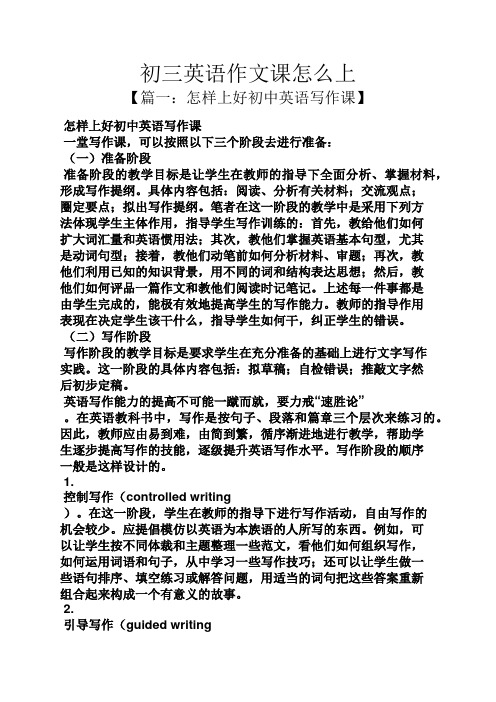
初三英语作文课怎么上【篇一:怎样上好初中英语写作课】怎样上好初中英语写作课一堂写作课,可以按照以下三个阶段去进行准备:(一)准备阶段准备阶段的教学目标是让学生在教师的指导下全面分析、掌握材料,形成写作提纲。
具体内容包括:阅读、分析有关材料;交流观点;圈定要点;拟出写作提纲。
笔者在这一阶段的教学中是采用下列方法体现学生主体作用,指导学生写作训练的:首先,教给他们如何扩大词汇量和英语惯用法;其次,教他们掌握英语基本句型,尤其是动词句型;接着,教他们动笔前如何分析材料、审题;再次,教他们利用已知的知识背景,用不同的词和结构表达思想;然后,教他们如何评品一篇作文和教他们阅读时记笔记。
上述每一件事都是由学生完成的,能极有效地提高学生的写作能力。
教师的指导作用表现在决定学生该干什么,指导学生如何干,纠正学生的错误。
(二)写作阶段写作阶段的教学目标是要求学生在充分准备的基础上进行文字写作实践。
这一阶段的具体内容包括:拟草稿;自检错误;推敲文字然后初步定稿。
英语写作能力的提高不可能一蹴而就,要力戒“速胜论”。
在英语教科书中,写作是按句子、段落和篇章三个层次来练习的。
因此,教师应由易到难,由简到繁,循序渐进地进行教学,帮助学生逐步提高写作的技能,逐级提升英语写作水平。
写作阶段的顺序一般是这样设计的。
1.控制写作(controlled writing)。
在这一阶段,学生在教师的指导下进行写作活动,自由写作的机会较少。
应提倡模仿以英语为本族语的人所写的东西。
例如,可以让学生按不同体裁和主题整理一些范文,看他们如何组织写作,如何运用词语和句子,从中学习一些写作技巧;还可以让学生做一些语句排序、填空练习或解答问题,用适当的词句把这些答案重新组合起来构成一个有意义的故事。
2.引导写作(guided writing)。
在这一阶段,学生有一些创作自由,但教师还应给学生一些有效的指导。
教师可以和学生一起议定若干写作提纲,然后让学生自己写作文。
初三老师如何讲解英语作文

初三老师如何讲解英语作文
在初三阶段,学生的英语写作能力已经具备了一定的基础,但仍需进
一步提升。
以下是一些讲解英语作文的方法:
1. 理解题目要求:首先,老师需要确保学生完全理解作文题目的要求。
这包括作文的主题、目的、字数限制等。
2. 构思框架:引导学生构建作文的基本框架,包括引言(Introduction)、主体(Body)和结尾(Conclusion)。
3. 词汇与短语:提供与作文主题相关的词汇和短语,帮助学生丰富语
言表达。
4. 语法结构:强调正确的语法结构,包括时态、语态、主谓一致等。
5. 逻辑连贯:教授如何使用逻辑连接词(如:however, therefore, moreover)来增强文章的连贯性。
6. 论点论据:指导学生如何提出清晰的论点,并提供充分的论据支持。
7. 审阅与修改:鼓励学生完成初稿后进行自我审阅,检查语法错误、
拼写错误以及逻辑不通之处。
8. 模仿与创新:让学生模仿优秀的作文样本,同时鼓励他们发挥创造力,形成自己独特的写作风格。
9. 实践练习:定期布置作文题目,让学生在规定时间内完成,模拟考
试环境。
10. 反馈与讨论:对学生的作文进行点评,指出优点和需要改进的地方,并在课堂上进行讨论,以提高学生的写作兴趣和能力。
通过这些方法,初三的英语老师可以有效地帮助学生提高英语写作技能,为高中阶段的学习打下坚实的基础。
初三英语作文教案模板及范文

课时:2课时教学目标:1. 培养学生运用英语进行写作的能力。
2. 提高学生对英语作文的审题、构思和表达技巧。
3. 增强学生的英语语感和写作信心。
教学重点:1. 学会审题和构思。
2. 掌握英语作文的基本结构和表达方式。
3. 提高写作速度和准确性。
教学难点:1. 学会运用恰当的词汇和句型。
2. 增强文章的逻辑性和连贯性。
教学过程:第一课时:一、导入1. 教师简要介绍本次作文的主题和内容。
2. 引导学生思考与主题相关的问题,激发学生的写作兴趣。
二、审题与构思1. 教师讲解审题的方法和技巧。
2. 学生根据教师提供的审题示例,进行审题练习。
3. 教师指导学生构思作文的结构和内容。
三、写作技巧1. 教师讲解英语作文的基本结构和表达方式。
2. 学生根据教师提供的范文,学习如何运用恰当的词汇和句型。
3. 教师示范如何运用过渡词和连接词,增强文章的逻辑性和连贯性。
四、写作练习1. 学生根据教师提供的作文题目,进行写作练习。
2. 教师巡回指导,纠正学生的写作错误,帮助学生提高写作水平。
五、总结与反馈1. 教师总结本次课的写作技巧和注意事项。
2. 学生展示自己的作文,互相评价和反馈。
第二课时:一、复习与巩固1. 教师带领学生回顾上节课的写作技巧和注意事项。
2. 学生进行写作练习,巩固所学知识。
二、作文修改与提升1. 教师指导学生修改自己的作文,提高作文质量。
2. 学生根据教师的建议,对作文进行修改和完善。
三、范文欣赏与写作指导1. 教师展示优秀范文,分析其优点和写作技巧。
2. 学生学习优秀范文,提高自己的写作水平。
四、课堂小结1. 教师总结本次课的收获和不足。
2. 学生分享自己的学习心得和感悟。
教学评价:1. 学生能够熟练运用所学写作技巧进行写作。
2. 学生的作文结构完整,内容充实,语言表达准确。
3. 学生在写作过程中,能够主动思考,积极表达。
教学反思:本节课通过审题、构思、写作技巧、写作练习、修改与提升等环节,帮助学生掌握了英语作文的基本结构和表达方式。
初中九年级英语写作教案
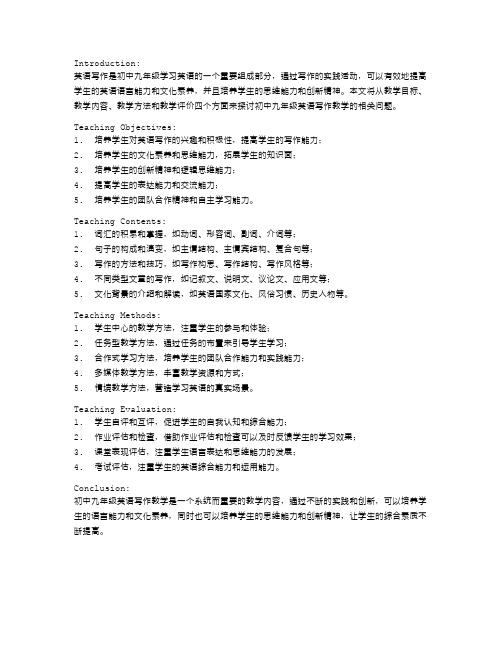
Introduction:英语写作是初中九年级学习英语的一个重要组成部分,通过写作的实践活动,可以有效地提高学生的英语语言能力和文化素养,并且培养学生的思维能力和创新精神。
本文将从教学目标、教学内容、教学方法和教学评价四个方面来探讨初中九年级英语写作教学的相关问题。
Teaching Objectives:1.培养学生对英语写作的兴趣和积极性,提高学生的写作能力;2.培养学生的文化素养和思维能力,拓展学生的知识面;3.培养学生的创新精神和逻辑思维能力;4.提高学生的表达能力和交流能力;5.培养学生的团队合作精神和自主学习能力。
Teaching Contents:1.词汇的积累和掌握,如动词、形容词、副词、介词等;2.句子的构成和演变,如主谓结构、主谓宾结构、复合句等;3.写作的方法和技巧,如写作构思、写作结构、写作风格等;4.不同类型文章的写作,如记叙文、说明文、议论文、应用文等;5.文化背景的介绍和解读,如英语国家文化、风俗习惯、历史人物等。
Teaching Methods:1.学生中心的教学方法,注重学生的参与和体验;2.任务型教学方法,通过任务的布置来引导学生学习;3.合作式学习方法,培养学生的团队合作能力和实践能力;4.多媒体教学方法,丰富教学资源和方式;5.情境教学方法,营造学习英语的真实场景。
Teaching Evaluation:1.学生自评和互评,促进学生的自我认知和综合能力;2.作业评估和检查,借助作业评估和检查可以及时反馈学生的学习效果;3.课堂表现评估,注重学生语言表达和思维能力的发展;4.考试评估,注重学生的英语综合能力和运用能力。
Conclusion:初中九年级英语写作教学是一个系统而重要的教学内容,通过不断的实践和创新,可以培养学生的语言能力和文化素养,同时也可以培养学生的思维能力和创新精神,让学生的综合素质不断提高。
九年级英文作文教案设计

九年级英文作文教案设计
教学目标:
1. 学生能够用英文流畅地写出一篇九年级英文作文;
2. 学生能够在写作中灵活运用语言,展示多样化的表达;
3. 学生能够注意段落的独立性和语言特点,以保持文本的跳跃性和即时性。
教学过程:
一、引入。
教师可以用一些有趣的话题或图片引入,让学生进入写作的状态。
二、讲解段落的独立性和语言特点。
教师可以通过讲解段落的独立性和语言特点,让学生明白每个
段落都应该有一个独立的主题,并且语言表达方式应该多样化。
三、示范写作。
教师可以进行一次示范写作,让学生看到如何在写作中灵活运
用语言,展示多样化的表达。
四、学生练习。
学生可以根据自己的兴趣选择一个话题,进行写作练习。
教师
可以在写作过程中给予学生指导和帮助。
五、展示和分享。
学生可以将自己的作品展示和分享,让其他同学进行点评和评价,以便提高自己的写作水平。
六、总结。
教师可以对学生的写作进行总结,让学生明白如何在写作中注
意段落的独立性和语言特点,以保持文本的跳跃性和即时性。
同时,教师也可以鼓励学生多加练习,提高自己的写作水平。
及反思人教版英语九年级全册Unit12writing优秀教学案例
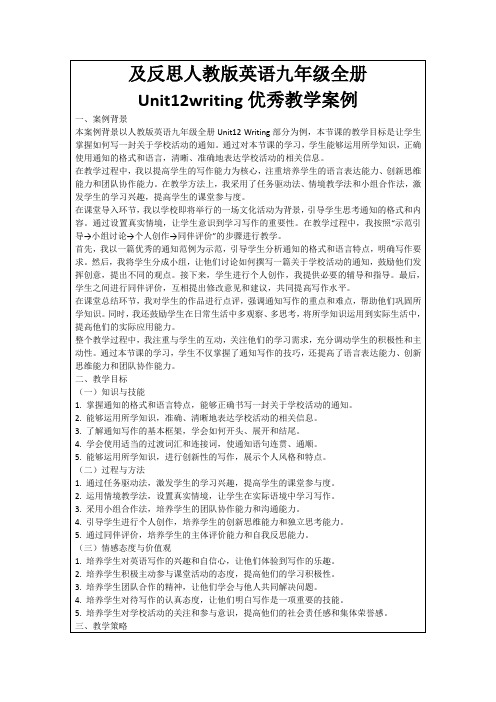
(二)问题导向
1.设计具有启发性的问题,引导学生思考通知的格式和内容,如“通知的开头应该写什么?”、“如何准确表达活动时间?”等,激发学生的思维活力。
2.通过问题引导学生分析通知的写作要求,如“通知与文章的区别在哪里?”、“如何在通知中使用恰当的过渡词汇?”等,帮助学生明确写作方向。
3.鼓励学生提出问题,互相交流学习心得,如“你在写作过程中遇到了哪些困难?”、“你是如何克服这些困难的?”等,促进学生之间的互动与交流。
(三)小组合作
1.划分学习小组,鼓励学生分工合作,共同完成写作任务。每个小组成员负责撰写通知的某一部分,最后将各部分整合成一篇完整的通知。
2.设立小组讨论环节,让学生在小组内交流写作思路、分享写作心得。通过小组讨论,培养学生之间的团队协作能力和沟通能力。
(五)作业小结
在本节课的作业环节,我布置了一项实践性作业:让学生撰写一篇关于学校活动的通知,并张贴在学校的公告栏上。我要求学生在撰写通知时,注意格式和语言的准确性,同时体现创新性和实用性。通过这项作业,让学生将所学知识运用到实际中,提高他们的写作能力和实践能力。
本节课的教学内容与过程紧密围绕通知写作这一主题,通过导入新课、讲授新知、学生小组讨论、总结归纳和作业小结等环节,引导学生掌握通知的格式和语言特点,提高他们的写作能力。同时,注重培养学生的团队协作能力和实际应用能力,使他们能够将所学知识运用到实际生活中。
3.小组合作法:在教学过程中,我引导学生进行小组合作,让他们共同讨论、撰写通知。这种教学方法不仅培养了学生的团队协作能力,还促进了学生之间的互动与交流,提高了课堂氛围。
初三英语作文如何教
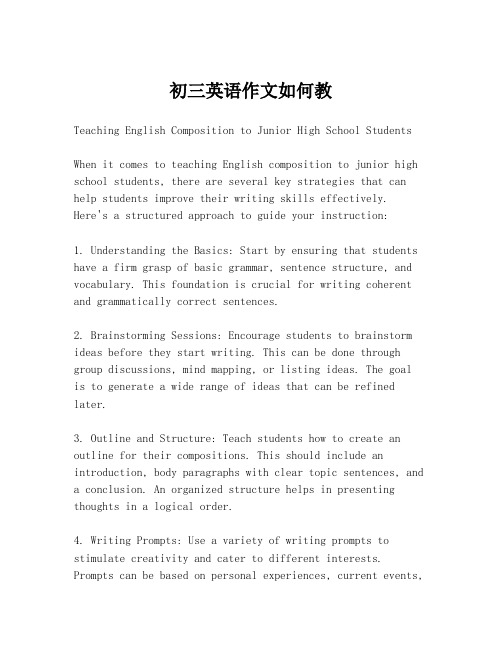
初三英语作文如何教Teaching English Composition to Junior High School StudentsWhen it comes to teaching English composition to junior high school students, there are several key strategies that can help students improve their writing skills effectively.Here's a structured approach to guide your instruction:1. Understanding the Basics: Start by ensuring that students have a firm grasp of basic grammar, sentence structure, and vocabulary. This foundation is crucial for writing coherent and grammatically correct sentences.2. Brainstorming Sessions: Encourage students to brainstorm ideas before they start writing. This can be done through group discussions, mind mapping, or listing ideas. The goal is to generate a wide range of ideas that can be refined later.3. Outline and Structure: Teach students how to create an outline for their compositions. This should include an introduction, body paragraphs with clear topic sentences, and a conclusion. An organized structure helps in presenting thoughts in a logical order.4. Writing Prompts: Use a variety of writing prompts to stimulate creativity and cater to different interests. Prompts can be based on personal experiences, current events,or imaginative scenarios.5. Peer Review: Implement a peer review process where students read and critique each other's work. This not only helps them learn from each other's mistakes but also improves their critical thinking skills.6. Focus on Clarity and Coherence: Emphasize the importance of clear and coherent writing. Teach students to avoid run-on sentences and to use appropriate transitions to connect their ideas.7. Vocabulary Building: Encourage the use of a thesaurus to find synonyms for common words, enriching their vocabulary and making their writing more descriptive.8. Editing and Proofreading: Teach students the importance of revising their work. This includes checking for spelling, grammar, punctuation, and overall flow. Make sure they understand the difference between editing for content and proofreading for errors.9. Model Essays: Provide examples of good and bad compositions to illustrate the points you're teaching. Analyzing model essays can help students understand what makes a piece of writing effective.10. Creative Writing: Allow for some creative writing exercises where students can experiment with different styles and genres. This can help them find their own voice and enjoy the writing process.11. Technology Integration: Use technology to support the writing process. Word processing software can help with editing and spell-checking, and online resources can provide additional vocabulary and writing tips.12. Encourage Reading: Reading is a critical component of writing. Encourage students to read a variety of texts in English to expose them to different writing styles and to improve their language skills.13. Set Realistic Goals: Help students set achievable goals for their writing. This could be as simple as using a new vocabulary word in each composition or as complex as improving their narrative structure.14. Provide Constructive Feedback: Always provide feedback that is specific, actionable, and positive. Help students understand how they can improve without discouraging them.15. Make it Fun: Keep the lessons engaging by incorporating games, storytelling, and other interactive activities that make writing enjoyable.By following these strategies, you can help your junior high school students develop the skills they need to write effective English compositions. Remember, patience and consistent practice are key to improvement.。
怎样教初三英语作文好

怎样教初三英语作文好Teaching English composition to eighth graders effectively involves a combination of strategies to engage students, foster their creativity, and enhance theirwriting skills. Here are some tips:1. Clear Instruction: Begin by explaining the basics of essay writing, including the structure of an essay (introduction, body paragraphs, conclusion) and the importance of coherent organization. Make sure students understand the prompt and what is expected of them.2. Modeling: Provide examples of well-written essays to demonstrate different writing styles, techniques, and structures. Analyze these examples with students to help them understand how to effectively convey ideas and arguments in writing.3. Brainstorming: Encourage students to brainstorm ideas before they start writing. This can be doneindividually, in pairs, or as a class discussion. Emphasize the importance of choosing a topic that interests them and that they feel passionate about.4. Outline Creation: Teach students how to create outlines to organize their thoughts and structure their essays. Emphasize the importance of including a clear thesis statement and supporting details in each paragraph.5. Drafting: Allow students ample time to draft their essays, providing feedback and guidance as needed. Encourage them to focus on clarity, coherence, and grammar during this stage.6. Peer Review: Incorporate peer review sessions where students can exchange drafts and provide constructive feedback to their classmates. This helps students develop critical thinking skills and learn from each other's writing.7. Revision and Editing: Teach students the importance of revising and editing their work. Encourage them toreread their essays carefully, checking for clarity, coherence, and grammatical errors. Provide guidance on how to improve their writing through revision.8. Creativity and Expression: Encourage students to express themselves creatively in their writing. Allow them to explore different writing styles, use descriptive language, and incorporate their own unique voice into their essays.9. Provide Resources: Offer resources such as writing guides, grammar handouts, and online tools to support students in their writing process. Encourage them to use these resources to enhance their writing skills.10. Celebrate Achievements: Recognize and celebrate students' achievements in writing. Showcase exemplary essays in the classroom, provide positive feedback, and create opportunities for students to share their work with their peers.By incorporating these strategies into your teachingapproach, you can help your eighth-grade students improve their English composition skills and become more confident writers.。
英语作文教学九上

英语作文教学九上Teaching English Writing in Grade Nine。
English writing is an essential part of English learning. In grade nine, students are expected to write more complex and sophisticated essays, which require a higher level of language proficiency and critical thinking skills. Here are some tips on how to teach English writing effectively in grade nine.Firstly, it is important to provide students with a clear understanding of the purpose and structure of different types of essays. For example, students need to know the difference between a narrative essay, a descriptive essay, and an argumentative essay. They also need to learn how to organize their ideas and present them in a logical and coherent way.Secondly, teachers should encourage students to read extensively in English, especially in the genre they arewriting about. Reading can help students to develop their vocabulary, grammar, and writing style. It can also inspire them to come up with new ideas and perspectives.Thirdly, teachers should provide students with ample opportunities to practice writing. This can be done through in-class writing exercises, homework assignments, and peer review sessions. Students should be given feedback on their writing, both from the teacher and from their peers, sothat they can learn from their mistakes and improve their writing skills.Fourthly, teachers should incorporate technology into their writing lessons. For example, they can use online writing tools to help students with grammar and spelling, or they can use multimedia resources to make the writing process more engaging and interactive.Finally, teachers should create a supportive and encouraging environment for their students. Writing can be a challenging and intimidating task, especially for students who are not confident in their language abilities.Teachers should provide positive feedback and praise for their students' efforts, and help them to build their confidence and self-esteem.In conclusion, teaching English writing in grade nine requires a comprehensive approach that includes clear instruction, extensive reading, ample practice, the use of technology, and a supportive learning environment. By following these tips, teachers can help their students to develop their writing skills and become more confident and proficient in English.。
